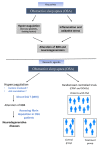Obstructive Sleep Apnea, Hypercoagulability, and the Blood-Brain Barrier
- PMID: 34300265
- PMCID: PMC8304023
- DOI: 10.3390/jcm10143099
Obstructive Sleep Apnea, Hypercoagulability, and the Blood-Brain Barrier
Abstract
Obstructive sleep apnea (OSA) is characterized by repeated episodes of intermittent hypoxia (IH) and is recognized as an independent risk factor for vascular diseases that are mediated by a multitude of mechanistic pathophysiological cascades including procoagulant factors. The pro-coagulant state contributes to the development of blood clots and to the increase in the permeability of the blood-brain barrier (BBB). Such alteration of BBB may alter brain function and increase the risk of neurodegenerative diseases. We aim to provide a narrative review of the relationship between the hypercoagulable state, observed in OSA and characterized by increased coagulation factor activity, as well as platelet activation, and the underlying neural dysfunction, as related to disruption of the BBB. We aim to provide a critical overview of the existing evidence about the effect of OSA on the coagulation balance (characterized by increased coagulation factor activity and platelet activation) as on the BBB. Then, we will present the emerging data on the effect of BBB disruption on the risk of underlying neural dysfunction. Finally, we will discuss the potential of OSA therapy on the coagulation balance and the improvement of BBB.
Keywords: blood–brain barrier; coagulation; neurodegenerative diseases; obstructive sleep apnea (OSA); procoagulant states.
Conflict of interest statement
The authors have no relevant conflict of interest to declare in relation to the content of this manuscript.
Figures



Similar articles
-
Intermittent Hypoxia and Its Impact on Nrf2/HIF-1α Expression and ABC Transporters: An in Vitro Human Blood-Brain Barrier Model Study.Cell Physiol Biochem. 2020 Dec 17;54(6):1231-1248. doi: 10.33594/000000311. Cell Physiol Biochem. 2020. PMID: 33326735
-
Early Increase in Blood-Brain Barrier Permeability in a Murine Model Exposed to Fifteen Days of Intermittent Hypoxia.Int J Mol Sci. 2024 Mar 6;25(5):3065. doi: 10.3390/ijms25053065. Int J Mol Sci. 2024. PMID: 38474310 Free PMC article.
-
Obstructive Sleep Apnea as a Risk Factor for Venous Thromboembolism: A Systematic Review.Cureus. 2022 Feb 28;14(2):e22729. doi: 10.7759/cureus.22729. eCollection 2022 Feb. Cureus. 2022. PMID: 35371730 Free PMC article. Review.
-
Cognitive Impairments, Neuroinflammation and Blood-Brain Barrier Permeability in Mice Exposed to Chronic Sleep Fragmentation during the Daylight Period.Int J Mol Sci. 2023 Jun 8;24(12):9880. doi: 10.3390/ijms24129880. Int J Mol Sci. 2023. PMID: 37373028 Free PMC article.
-
Obstructive sleep apnea and cognitive impairment: addressing the blood-brain barrier.Sleep Med Rev. 2014 Feb;18(1):35-48. doi: 10.1016/j.smrv.2012.12.003. Epub 2013 Mar 28. Sleep Med Rev. 2014. PMID: 23541562 Free PMC article. Review.
Cited by
-
Association between poor sleep quality and an increased risk of dry eye disease in patients with obstructive sleep apnea syndrome.Front Med (Lausanne). 2022 Oct 31;9:870391. doi: 10.3389/fmed.2022.870391. eCollection 2022. Front Med (Lausanne). 2022. PMID: 36388897 Free PMC article.
-
Clinical and economic outcomes with rivaroxaban versus warfarin in patients with nonvalvular atrial fibrillation and obstructive sleep apnea: retrospective analysis of US healthcare claims.J Interv Card Electrophysiol. 2025 Apr;68(3):613-624. doi: 10.1007/s10840-024-01940-6. Epub 2024 Nov 25. J Interv Card Electrophysiol. 2025. PMID: 39585535 Free PMC article.
-
Assessment of Alzheimer's disease-related biomarkers in patients with obstructive sleep apnea: A systematic review and meta-analysis.Front Aging Neurosci. 2022 Oct 13;14:902408. doi: 10.3389/fnagi.2022.902408. eCollection 2022. Front Aging Neurosci. 2022. PMID: 36313031 Free PMC article.
-
Paroxysmal slow wave events are associated with cognitive impairment in patients with obstructive sleep apnea.Alzheimers Res Ther. 2022 Dec 30;14(1):200. doi: 10.1186/s13195-022-01153-x. Alzheimers Res Ther. 2022. PMID: 36585689 Free PMC article. Clinical Trial.
-
The role of platelets in the blood-brain barrier during brain pathology.Front Cell Neurosci. 2024 Jan 8;17:1298314. doi: 10.3389/fncel.2023.1298314. eCollection 2023. Front Cell Neurosci. 2024. PMID: 38259501 Free PMC article. Review.
References
-
- Cardiovascular Diseases. [(accessed on 26 April 2020)]; Available online: https://www.who.int/westernpacific/health-topics/cardiovascular-diseases.
Publication types
LinkOut - more resources
Full Text Sources

